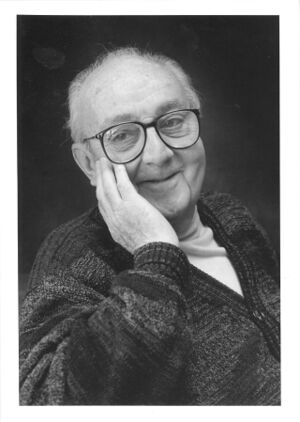George E. P. Box (nonfiction): Difference between revisions
(Created page with "George Edward Pelham Box FRS[2] (18 October 1919 – 28 March 2013) was a British statistician, who worked in the areas of quality control, time-series analysis, design of exp...") |
No edit summary |
||
| (One intermediate revision by the same user not shown) | |||
| Line 1: | Line 1: | ||
George Edward Pelham Box FRS | [[File:George_E_P_Box.jpg|thumb|George Edward Pelham Box.]]'''George Edward Pelham Box''' FRS (18 October 1919 – 28 March 2013) was a British statistician, who worked in the areas of quality control, time-series analysis, design of experiments, and Bayesian inference. | ||
He was born in Gravesend, Kent, England. Upon entering university he began to study chemistry, but was called up for service before finishing. During World War II, he performed experiments for the British Army exposing small animals to poison gas. To analyze the results of his experiments, he taught himself statistics from available texts. After the war, he enrolled at University College London and obtained a bachelor's degree in mathematics and statistics. He received a PhD from the University of London in 1953, under the supervision of Egon Pearson. | He was born in Gravesend, Kent, England. Upon entering university he began to study chemistry, but was called up for service before finishing. During World War II, he performed experiments for the British Army exposing small animals to poison gas. To analyze the results of his experiments, he taught himself statistics from available texts. After the war, he enrolled at University College London and obtained a bachelor's degree in mathematics and statistics. He received a PhD from the University of London in 1953, under the supervision of Egon Pearson. | ||
| Line 23: | Line 23: | ||
External links: | External links: | ||
* [ George E. P. Box] @ Wikipedia | * [https://en.wikipedia.org/wiki/George_E._P._Box George E. P. Box] @ Wikipedia | ||
[[Category:Nonfiction (nonfiction)]] | [[Category:Nonfiction (nonfiction)]] | ||
[[Category:Mathematicians (nonfiction)]] | [[Category:Mathematicians (nonfiction)]] | ||
[[Category:People (nonfiction)]] | [[Category:People (nonfiction)]] | ||
[[Category:Statisticians (nonfiction)]] | [[Category:Statisticians (nonfiction)]] | ||
Latest revision as of 18:25, 15 February 2017
George Edward Pelham Box FRS (18 October 1919 – 28 March 2013) was a British statistician, who worked in the areas of quality control, time-series analysis, design of experiments, and Bayesian inference.
He was born in Gravesend, Kent, England. Upon entering university he began to study chemistry, but was called up for service before finishing. During World War II, he performed experiments for the British Army exposing small animals to poison gas. To analyze the results of his experiments, he taught himself statistics from available texts. After the war, he enrolled at University College London and obtained a bachelor's degree in mathematics and statistics. He received a PhD from the University of London in 1953, under the supervision of Egon Pearson.
From 1948 to 1956, Box worked as a statistician for Imperial Chemical Industries (ICI). While at ICI, he took a leave of absence for a year and served as a visiting professor at the North Carolina State University at Raleigh (now North Carolina State University). He later went to Princeton University where he served as Director of the Statistical Research Group. In 1960, Box moved to the University of Wisconsin–Madison to create the Department of Statistics. He was appointed Vilas Research Professor of Statistics (the highest honor accorded to any faculty member at the University of Wisconsin–Madison) in 1980.[8] Box and Bill Hunter co-founded the Center for Quality and Productivity Improvement at the University of Wisconsin–Madison in 1984. Box officially retired in 1992, becoming an Emeritus Professor.
His name is associated with results in statistics such as Box–Jenkins models, Box–Cox transformations, Box–Behnken designs, and others. Box wrote that "essentially, all models are wrong, but some are useful" in his book on response surface methodology with Norman R. Draper.
He has been called "one of the great statistical minds of the 20th century".
In the News
Fiction cross-reference
Nonfiction cross-reference
External links:
- George E. P. Box @ Wikipedia
